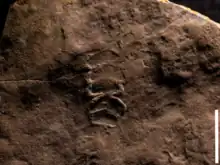Palaeopascichnus
Palaeopascichnus is an Ediacaran fossil comprising a series of lobes, first originating before the Gaskiers glaciation;[1] it is plausibly a protozoan, but probably unrelated to the classical 'Ediacaran biota'.[2] Once thought to represent a trace fossil, it is now recognized as a body fossil[3] and corresponds to the skeleton of an agglutinating organism.[4]
| Palaeopascichnus Temporal range: Ediacaran, | |
|---|---|
 | |
| Scientific classification | |
| Kingdom: | incertae sedis |
| Genus: | †Palaeopascichnus Palij, 1976 |
| Species | |
| |
| Synonyms | |
| |
References
- Liu, Alexander G.; Tindal, Benjamin H. (2020). "Ediacaran macrofossils prior to the ~580 Ma Gaskiers glaciation in Newfoundland, Canada". Lethaia. 54 (2): 260–270. doi:10.1111/let.12401.
- Antcliffe, J. B.; Gooday, A. J.; Brasier, M. D. (2011). "Testing the protozoan hypothesis for Ediacaran fossils: A developmental analysis of Palaeopascichnus". Palaeontology. 54 (5): 1157. doi:10.1111/j.1475-4983.2011.01058.x.
- Jensen, S. (2003). "The Proterozoic and Earliest Cambrian Trace Fossil Record; Patterns, Problems and Perspectives". Integrative and Comparative Biology. 43 (1): 219–28. doi:10.1093/icb/43.1.219. PMID 21680425.
- Kolesnikov, Anton V; Rogov, Vladimir I; Bykova, Natalia V; Danelian, Taniel; Clausen, Sébastien; Maslov, Andrey V; Grazhdankin, Dmitriy V (2018). "The oldest skeletal macroscopic organism Palaeopascichnus linearis". Precambrian Research. 316: 24–37. Bibcode:2018PreR..316...24K. doi:10.1016/j.precamres.2018.07.017. S2CID 134885946.
This article is issued from Wikipedia. The text is licensed under Creative Commons - Attribution - Sharealike. Additional terms may apply for the media files.